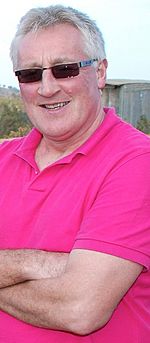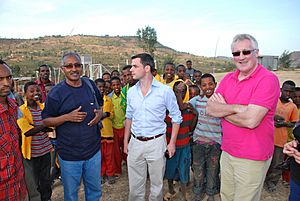Pat Spillane facts for kids

Spillane in 2012
|
|||
| Personal information | |||
|---|---|---|---|
| Irish name | Pádraig Ó Spealáin | ||
| Sport | Gaelic football | ||
| Position | Left Half Forward | ||
| Born | Patrick Gerard Spillane 1 December 1955 Templenoe, County Kerry, Ireland |
||
| Height | 6 ft 0 in (1.83 m) | ||
| Occupation | Retired secondary school principal | ||
| Club(s) | |||
| Years | Club | ||
| Templenoe | |||
| Club titles | |||
| Kerry titles | 2 | ||
| Munster titles | 1 | ||
| All-Ireland Titles | 1 | ||
| Inter-county(ies) | |||
| Years | County | Apps (scores) | |
|
1974–1991
|
Kerry | 56 (19–123) | |
| Inter-county titles | |||
| Munster titles | 12 | ||
| All-Irelands | 8 | ||
| NFL | 2 | ||
| All Stars | 9 | ||
Patrick Gerard Spillane (born 1 December 1955), known as Pat Spillane, is a famous Irish former Gaelic football player and sports commentator. He played for the Kerry county team for seventeen years, from 1974 to 1991. Many people think Pat Spillane is one of the greatest Gaelic football players ever.
Pat was born in Templenoe, County Kerry. His family had a strong history in Gaelic football. His father, Tom, and his uncle, Jerome, both played for Kerry and won junior All-Ireland medals. His mother's uncles, Jackie, Dinny, Mickey, and Teddy Lyne, also won All-Ireland medals with Kerry in the 1940s and 1950s.
Contents
Pat Spillane's Early Life and Education
Pat Spillane played Gaelic football while he was a student at St Brendan's College in Killarney. There, he won two school championships called the Corn Uí Mhuirí. However, he never won the All-Ireland school championship, the Hogan Cup.
After school, Pat went to Thomond College in Limerick. He studied to become a P.E. (Physical Education) teacher. His brother Mick also joined him at Thomond College, and they both played on the college football team.
Family Business and Career After Football
In the late 1980s, Pat took over his family's pub in Templenoe. He also worked as a P.E. and geography teacher at St. Gobán's College in Bantry, County Cork. He later became the vice-principal and then the principal of the school in 2011.
Pat retired as principal in 2012. He then chaired an organization called CEDRA, which worked to create jobs in rural areas until 2025. Pat lives in Templenoe with his wife, Rosarii, and their three children: Cara (born 1990), Shóna (born 1992), and Pat Jnr (born 1997). He still helps train local teams. His son, Pat Jnr, has played for the Sligo county team since 2022.
Pat's brother, Tom, later bought the family pub from Pat. Tom plans to run it with his sons, Killian and Adrian, who are also Kerry footballers.
Pat Spillane's Playing Career
Pat Spillane played club football for his local team, Templenoe. He won a county novice championship with them in 1973 and a county junior championship in 1975.
Club Success with Thomond College
While at Thomond College, Pat also played club football. In 1977, he was the captain when his team won the Limerick senior championship. They then went on to win the Munster club title.
Pat led his team to the All-Ireland club final in Croke Park. They won the game, giving Pat an All-Ireland club medal.
Playing for Kerry: Minor and Under-21 Teams
Pat Spillane started playing for the Kerry minor football team when he was young. He then moved up to the Kerry under-21 team. He won two Munster titles in a row in 1975 and 1976.
He also won two All-Ireland medals with the under-21 team in 1975 and 1976.
Senior Career with Kerry: A Legendary Player
Pat Spillane made his senior debut for Kerry in 1974. Over the next seventeen years, he became one of the most successful players in Gaelic football history.
- First All-Ireland Win (1975): In 1975, Pat won his first senior Munster title. Kerry, with a very young team, then surprised everyone by beating Dublin in the All-Ireland final. Pat, at just 19 years old, was given the honor of accepting the Sam Maguire Cup.
- More Munster Titles: He won a total of twelve Munster titles during his career.
- National League Wins: Pat also won two National Football League medals.
- Four-in-a-Row All-Irelands (1978-1981): From 1978 to 1981, Kerry achieved an amazing feat, winning four All-Ireland championships in a row. Pat was a key part of this team. In 1978, Kerry beat Dublin in the All-Ireland final by a huge score. Pat even played as a goalkeeper for a short time in that game!
- Three-in-a-Row All-Irelands (1984-1986): After a tough loss in 1982 and recovering from a serious knee injury in 1983, Pat came back strong. Kerry won three more All-Ireland titles in a row from 1984 to 1986.
- Record-Breaking Success: Pat Spillane won a total of eight All-Ireland senior medals. This is a record he shares with several other players. His brothers, Mick and Tom, also played with him on the Kerry team. Together, the three brothers won a combined 19 All-Ireland medals, which is a record for a set of brothers.
- Retirement: Pat played his last game for Kerry in August 1991.
Inter-Provincial and International Play
Pat also played for the Munster team in the inter-provincial competition called the Railway Cup. He won four Railway Cup medals between 1976 and 1981.
He also played for the Ireland team in the International Rules series against Australia in 1986 and 1987.
Pat Spillane's Records and Awards
Pat Spillane holds many impressive records in Gaelic football:
- All-Ireland Medals: He shares the record for the most All-Ireland senior winners' medals with eight.
- All-Star Awards: He won nine All-Star awards, which is a record for a Gaelic footballer. These awards recognize the best players in the country each year.
- Footballer of the Year: He was named Texaco Footballer of the Year twice, in 1978 and 1984. His 1984 win was especially impressive because he had just recovered from a serious injury.
- Team of the Century and Millennium: In 1984, Pat was chosen for the GAA Football Team of the Century. He was one of only two players from his era to be on that team. He was also named on the Football Team of the Millennium in 1999.
Pat Spillane's Media Career
After he stopped playing Gaelic football, Pat Spillane started a career in the media. He joined The Sunday Game, a popular sports show on RTÉ, in 1992. He started as a co-commentator and then became a studio analyst, sharing his opinions on games. He also hosted the highlights version of the show for a few years.
Pat also writes a weekly column for the Sunday World newspaper.
He was known for his strong opinions, especially about certain teams' playing styles. For example, in 2003, he famously called the defensive style of some Ulster teams "puke football."
On 9 July 2022, Pat Spillane announced that the 2022 All-Ireland Football Final would be his last appearance as a commentator on The Sunday Game, after three decades.
Honours
- Templenoe
- Kerry Novice Football Championship:
- Winner (1): 1973
- Kerry Junior Football Championship:
- Winner (1): 1975
- Kenmare District
- Kerry Senior Football Championship:
- Winner (1): 1987
- Thomond College
- All-Ireland Senior Club Football Championship:
- Winner (1): 1978
- Munster Senior Club Football Championship:
- Winner (1): 1977
- Limerick Senior Football Championship:
- Winner (1): 1977
- Kerry
- All-Ireland Senior Football Championship:
- Winner (8): 1975, 1978, 1979, 1980, 1981, 1984, 1985, 1986
- Munster Senior Football Championship:
- Winner (12): 1975, 1976, 1977, 1978, 1979, 1980, 1981, 1982 (sub), 1984, 1985, 1986, 1991
- National Football League:
- Winner (4): 1973–74 (sub), 1976–77, 1981–82 (sub), 1983–84
- All-Ireland Under-21 Football Championship:
- Winner (2): 1975, 1976
- Munster Under-21 Football Championship:
- Winner (2): 1975, 1976
- Munster
- Railway Cup:
- Winner (4): 1976, 1977, 1978, 1981
- Ireland
- International Rules:
- Winner (1): 1986
 | Stephanie Wilson |
 | Charles Bolden |
 | Ronald McNair |
 | Frederick D. Gregory |


